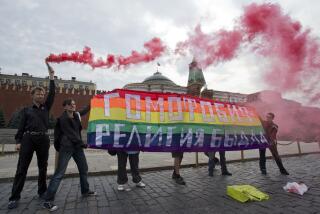Foreigners Angered by Stiff Russian Tax : * Protest: New levy on income has some Westerners threatening to pack up and go home.
- Share via
MOSCOW — Westerners working in Russia are howling in protest over a new income tax law laying claim to 60% of their earnings. Some are threatening to pack up and go home unless the government backs down.
“Some people will leave for sure,” said Andrew Ivanyi, general manager of Moscow’s new Canadian-run Aerostar Hotel.
“We, as a company, might have to cut the number of expatriates that we have. It will invariably mean that everybody suffers,” Ivanyi said.
The new tax on individual income applies to all foreigners who live in Russia more than six months of the year, and whose total income is more than 420,000 rubles ($3,500 at the current exchange rate).
Some aspects of the law remain murky, such as exactly how it will be enforced and whether it covers citizens of other nations within the Commonwealth of Independent States.
It requires foreigners to give the government an estimate of their 1992 income by May 15. Only diplomats are exempt.
The deadline has pushed businesses from several countries to band together to lobby the government, arguing that the stiff tax rate could cripple small businesses and discourage new businesses from opening at a time when Russia badly needs foreign investment and Western know-how.
Their hope is that the government will set a special exchange rate for calculating foreigners’ tax liability--10 rubles to $1 instead of the current exchange rate of 120 to $1.
A $40,000 salary would then be translated to 400,000 rubles instead of 4.8 million rubles. The resulting tax bill would be 240,000 rubles, about $2,000, instead of 2.9 million rubles, or about $24,000.
First Deputy Prime Minister Yegor Gaidar, the architect of Russia’s economic reforms, proposed the lenient rate in a Jan. 10 letter to the Russian Central Bank, but never got an answer.
Vladimir Smirnov, head of the bank’s foreign operations department, told the Associated Press that the matter was still being discussed.
Meanwhile, many foreigners are looking for ways around the law.
“I’ve been told that some companies are considering a scheme to rotate expatriates so that nobody’s here for more than six months,” said Edgar Fulton, head of the U.S. Embassy’s commercial office.
Besides being hugely expensive, this could delay or disrupt everything from construction projects to business training programs for Russians.
U.S. Treasury Secretary Nicholas F. Brady discussed the tax issue in a recent meeting with Gaidar.
Fulton said the U.S. Embassy will raise it again in meetings leading up to the June summit between Russian President Boris N. Yeltsin and President Bush “in the hope we can impress upon the Russian government that it may have a tax situation here that is actually a deterrent to bringing in Western business.”
Even the Moscow Tax Inspectorate is sympathetic.
“I think it is unfair to take away 60% of people’s income,” said Vladimir Voronkov, head of the department responsible for collecting the tax from foreigners.
More to Read
Sign up for Essential California
The most important California stories and recommendations in your inbox every morning.
You may occasionally receive promotional content from the Los Angeles Times.













